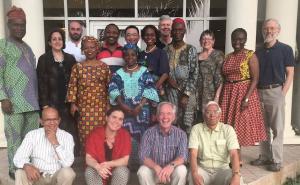Cricket White, a member of the International Council of Initiatives of Change, recently returned from their annual face-to-face meeting held in Lagos, Nigeria. She writes about what she discovered on her journey and from the people she met.
As I left the United States and headed to Nigeria, my thoughts bounced from images that our media has hyped of burned out villages and crying children, to the picture of enormous ships carrying millions of gallons of oil, to the faces of my Nigerian friends, individuals committed to values in their personal and corporate lives. What would prove to be the "true" story?
 I am a member of the International Council of Initiatives of Change and our one annual face-to-face meeting was held in Lagos, Nigeria, January 9 - February 10, 2016. The local Initiatives of Change team invited us to meet there to help us know more about their work and to view the world from their perspective.
I am a member of the International Council of Initiatives of Change and our one annual face-to-face meeting was held in Lagos, Nigeria, January 9 - February 10, 2016. The local Initiatives of Change team invited us to meet there to help us know more about their work and to view the world from their perspective.Lagos is the most populous city on the continent of Africa, at 21 million people. With no governmental social services provided, and the poverty and pollution that is a natural byproduct of such density and neglect, it is a place of extreme polarization. The oil industry makes a few people extraordinarily rich and the rest live with modest means or in relative or extreme poverty.
What has emerged is an entrepreneurial spirit that permeates the atmosphere; small retail stalls and stands proliferate across the city, selling everything from fruit to funeral services to fried meats. It is a vibrant, energetic city, with comfort and abject poverty absolutely cheek-to-jowl. Small local buses careen in and out of traffic, stopping to drop off passengers in the street or on the curbs, even as large expensive limousines push their way through the never ending traffic snarls.
But the truth of any place is in the people, not the cars or the markets. Nigerians that I met and talked to were genuinely, ubiquitously warm, gracious and extraordinarily generous. Whether it was to make a concerted effort to find the thing that a visitor needed, to sharing time or space, there was a warm-hearted outreach to each of us.
The Nigerian Initiatives of Change team exemplifies these values. It is led by a president and 7 board members. They count approximately 250 people as "members". Their success in engaging elders and young adults alike is built on acceptance and accompaniment. The guiding principle of the Nigerian programs is that anyone with an idea of how to impact an area in a positive way can propose it to the Nigerian team and they will assist in any way that is possible. “We welcome anyone and everyone to discover their calling within the IofC team." Instead of organizing every program under a stated focus, programs are suggested by those who are passionate about them and then the team helps them plan and see it through. Thus the programs are varied and reach out and touch many different people. They range from teen and parent retreats to mentoring volunteers, they offer a program focused on "Living differently" and Creators of Peace Circles, and in the future they hope to develop a drama program to share IofC values.
We had the pleasure and honor of spending several hours with Imam Ashafa and Pastor James Wuye as they shared their work today and the direction they are moving. While a small "organization" has evolved around them, their methodology of building trust is still anchored in their own narrative of how they met, how they fought against each other and the story of their reconciliation and personal relationship. They pair their narrative with a carefully crafted dialogue process which is then provided to and used in polarized villages and towns to begin the process of healing and trust building.
My leaving thoughts were about the extreme polarization of this nation, and Lagos, but the enormous potential that exists in its people – entrepreneurial and generous, committed to supporting ethical practices in government and business, and an amazing welcoming spirit. The true story is in its people.

